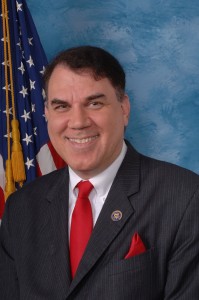 A U.S. Congressman was the victim of a Reston financial planner’s scheme that bilked investors out of more than $35 million, according to media reports.
A U.S. Congressman was the victim of a Reston financial planner’s scheme that bilked investors out of more than $35 million, according to media reports.
Alan Grayson (D-Florida 9th) lost about $18 million investing with William Dean Chapman. Chapman, the founder of Reston-based Alexander Capital Markets, was sentenced to 12 years in prison in federal court in Alexandria on Friday. Prosecutors say 122 investors lost a collective $36 million over several years.
Grayson was identified in court papers only by the initials A.G., but the Congressman on Monday confirmed he is the A.G. in the report. Greyson is a lawyer elected first elected to Congress in 2009.
Officials said that investors would transfer stock holdings to Chapman as collateral for loans. Chapman then sold the stocks, despite promising investors that they would get back the value of their stocks. If the stocks did not perform, borrowers could keep the money they were loaned. If the borrowers’ stocks did well, they would repay the loan with interest, and Chapman was supposed to return the stocks to the investor at their increased value.
According to the court papers, Chapman, who pled guilty to the charges in May, sold the stocks and had no way to fulfill his obligations if a client’s stock portfolio did well.
“That’s why (Chapman) is going to prison for a long, long time,” Grayson told the New York Daily News. “At least in the end, some kind of justice was served.”
More from The Daily News:
Lawyers for Chapman said it was the strength of Grayson’s stocks that caused Chapman’s scheme to crumble. Chapman and Grayson negotiated a payment plan, according to court records, but it was not enough to keep Chapman’s positions from collapsing.
“Because the return on A.G.’s commodities investments were so astronomical, ACM could not meet its obligations under the loan agreements,” defense lawyer Whitney Minter wrote.
In 2007, Grayson had $9.35 million in a stock portfolio that Chapman was supposed to be holding as collateral. In that year alone, the portfolio’s value increased by 147 percent, to $23 million, according to a chart in the court documents.
It is not the first time Grayson, who represents parts of the Orlando area, has lost tens of millions of dollars in a fraud scheme. In 2009, he won a $34 million judgment after filing a lawsuit in South Carolina under federal racketeering laws against a company called Derivium Capital. Derivium’s business plan for hedging an investor’s stock profile was nearly identical to the plan outline by Chapman.
Grayson said he first entered into deals with Chapman in 2003, well before the deal with Derivium went south, so he had no reason to be suspicious the arrangement.
And he said the loans themselves were a perfectly reasonable way to manage his portfolio, but relied on Chapman and Derivium to hold up their end of the bargain. He disputed that the astronomical returns to which he was entitled caused Chapman’s downfall.
“If they had not sold the collateral, it all would have worked,” said Grayson, who is generally listed as one of the 20 wealthiest members of Congress with assets of more than $20 million. His financial disclosure forms list holdings in dozens of stocks. His dealings with Chapman preceded his time in Congress, which began in 2009.

